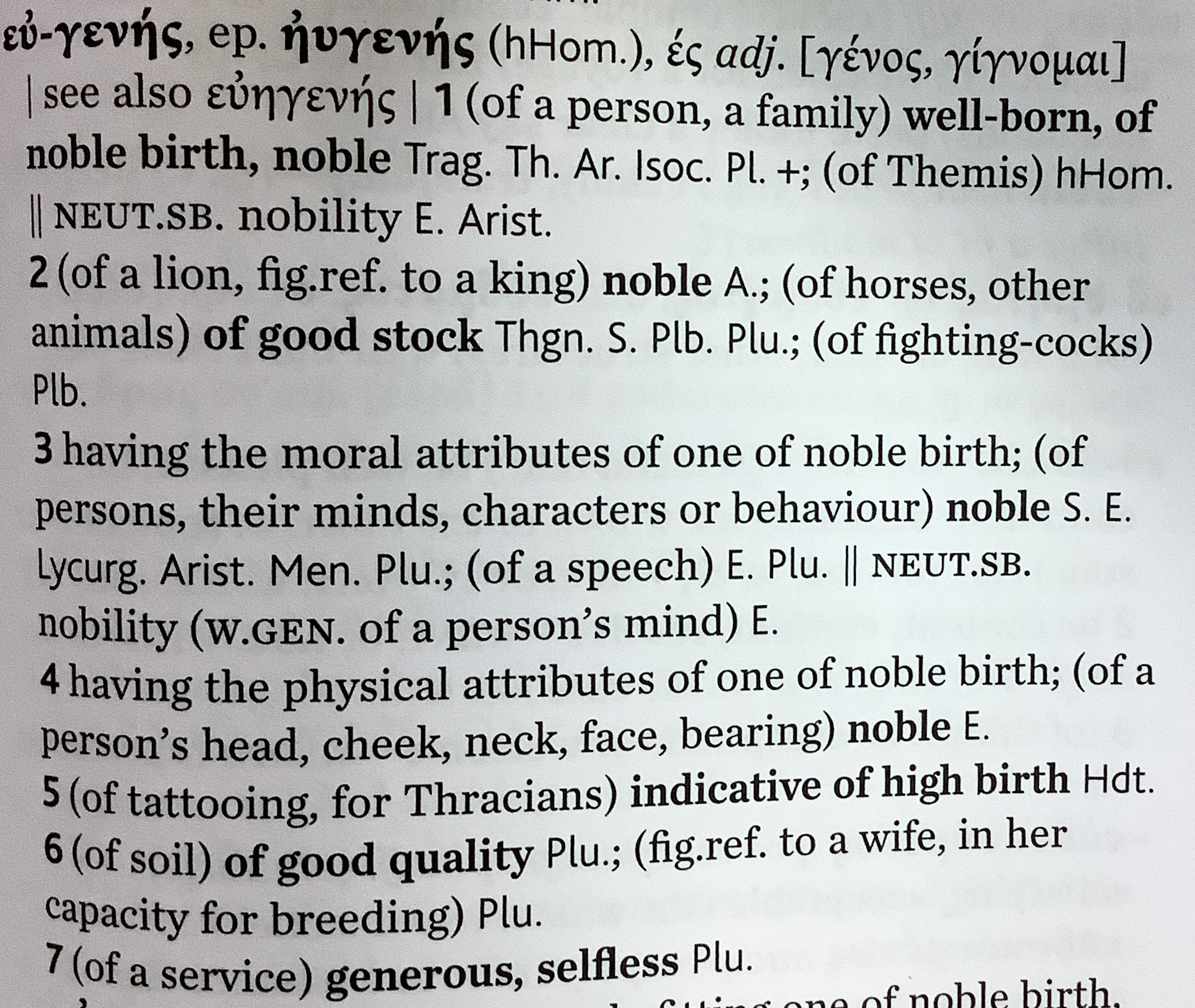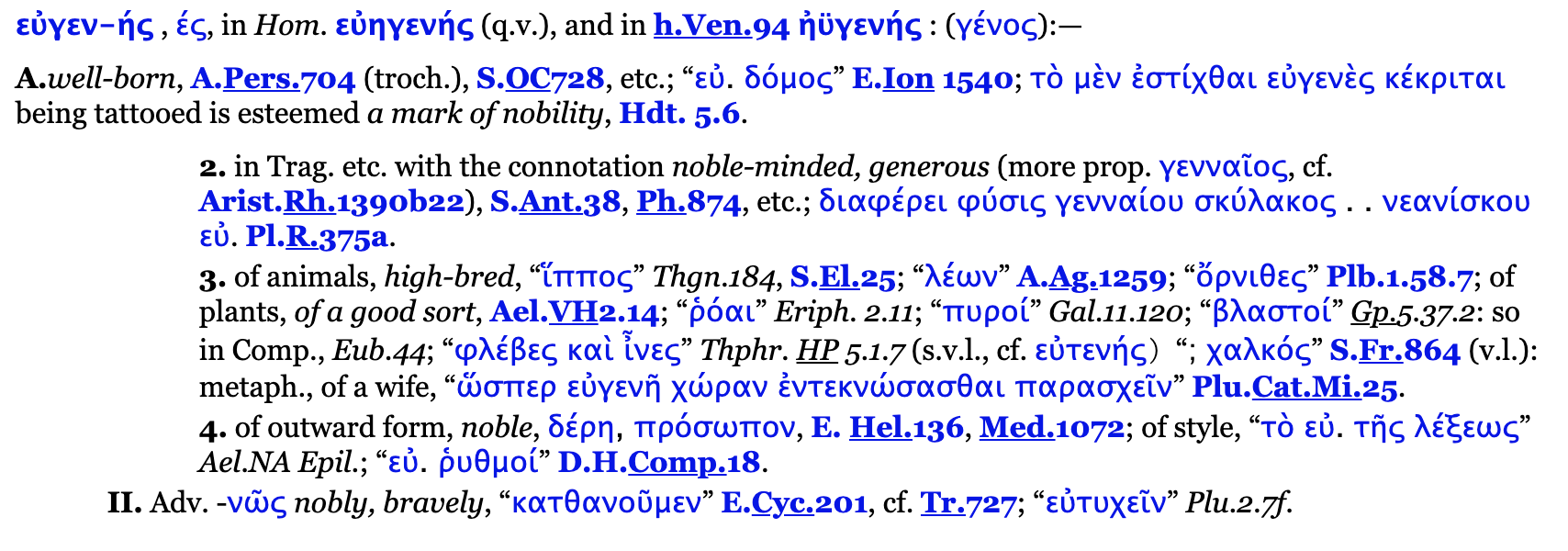I’ve found an opportunity to open my new copy of The Cambridge Greek Lexicon for a smell and a gander. (Seriously, give your copy a whiff and see if you don’t detect a distinct scent.) The purpose of this post is to show what an entry looks like and offer a case study of how it might help in reading the Gospels and Acts. Note that NT coverage in this lexicon includes only the Gospels and Acts, and the LXX is not considered. Here is the passage I’m looking at in Greek and English.
Acts 17:10 (NA28) Οἱ δὲ ἀδελφοὶ εὐθέως διὰ νυκτὸς ἐξέπεμψαν τόν τε Παῦλον καὶ τὸν Σιλᾶν εἰς Βέροιαν, οἵτινες παραγενόμενοι εἰς τὴν συναγωγὴν τῶν Ἰουδαίων ἀπῄεσαν.
Acts 17:11 (NA28) οὗτοι δὲ ἦσαν εὐγενέστεροι τῶν ἐν Θεσσαλονίκῃ, οἵτινες ἐδέξαντο τὸν λόγον μετὰ πάσης προθυμίας καθ’ ἡμέραν ἀνακρίνοντες τὰς γραφὰς εἰ ἔχοι ταῦτα οὕτως.
Acts 17:10 (ESV) The brothers immediately sent Paul and Silas away by night to Berea, and when they arrived they went into the Jewish synagogue.
Acts 17:11 (ESV) Now these Jews were more noble than those in Thessalonica; they received the word with all eagerness, examining the Scriptures daily to see if these things were so.
In this passage, the adjective εὐγενής, appears as a comparative and is translated as “more noble.” Below you can see the entry for εὐγενής from The Cambridge Greek Lexicon.

The head-group begins with the headword εὐγενής. In the epic dialect, this word takes the form εὐηγενής found in Homeric Hymns. This word’s part of speech is an adjective and it is derived from or related to γένος (birth) and γίγνομαι (to be born). Seven senses follow, offering definitions (in Roman light font) and glosses (in bold). Authors cited under each sense are listed chronologically.
Although The Cambridge Greek Lexicon covers all the words found in the Gospels and Acts, it does not cite the NT under any of this word’s seven senses. But if it was to do so, we would expect to find it under the third sense “having the moral attributes of one of noble birth; …noble.” Attestation for this usage can be found in authors Sophocles, Euripedes, Lycurgus, Aristotle, Menander, and Plutarch. It also describes a speech in Euripides and Plutarch. (Evidence does not include references.) The double vertical lines that follow indicate a change of function. In this case, εὐγενής can also function as a neuter substantive to mean “nobility” as it does in Euripides.
This is a very brief overview of The Cambridge Greek Lexicon that will likely only appeal to someone interested in using it for New Testament study. For an engaging series on whether or not New Testament students should even bother with this enterprise, see Dirk Jongkind’s four-part series beginning here. Will Ross’s interview with lexicon editor Prof. James Diggle (available here) is also worth your time.
Just for fun, I’ve included the GE (BrillDAG/MGS) and LSJ entries along with BDAG.
GE / BrillDAG / MGS
εὐγενής -ές [εὖ, γίγνομαι] ⓐ well born, noble, of noble origin (or family, stock, root), of pers. and animals Thgn. 184 (horse) Aeschl. Pers. 704 (pers.), Ag. 1259 (lion) etc. | analog.: τὸ μὲν ἐστίχθαι εὐγενὲς κέκριται being tattooed is judged a sign of nobility Hdt. 5.6.2; ἐς εὐγενῆ δόμον into a noble house Eur. Ion 1540 | of plants = of a good species or quality Ael. V.H. 2.14 Geop. 5.37.2 etc. | of metal Soph. fr. 864 | fig.: τὴν θυγατέρα … αὑτῷ … ὥσπερ εὐγενῆ χώραν ἐντεκνώσασθαι παράσχῃ he trusted the daughter to him as fertile land for producing children Plut. CMi. 25.4 ‖ noble (in mind), of noble and generous feelings (= γενναῖος) Soph. Ant. 38, al. etc. | but: διαφέρειν φύσιν γενναίου σκύλακος … νεανίσκου εὐγενοῦς; does the nature of a puppy of good stock differ from that of a well born youth? Plat. Rp. 375a ⓑ noble, lovely, outstanding Eur. Med. 1072 (face), al. etc. ⓒ rhet. noble, elevated, of style Dion. Comp. 3.11, al. etc. ‖ compar. -έστερος | superl. -έστατος epic ἠυγεν- (cf. also εὐηγενής) ♦ adv. εὐγενῶς nobly, generously, bravely Eur. Cycl. 201, al.; καρτέρησον εὐ. suffer nobly Men. Sam. 356 Plut. Lib. educ. 7f etc.
Entry copied from Logos Bible Software.
LSJ

BDAG

Image from Accordance Bible Software.
Thanks Brent – just a note that your references to ESV and NA28 are flipped.
Fixed. Thanks, Paul! =)